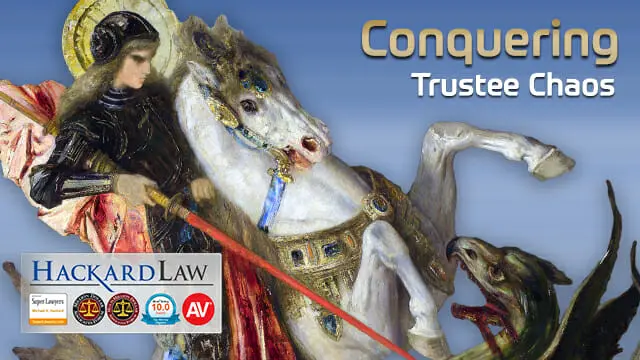
California Trust & Estate Lawsuits | Can Trustee Chaos Be Conquered?
The telephone call can be long or short. The message may be clear at the outset or only parsed out after a series of my seemingly unrelated questions. The caller’s emotions may be controlled or buffeted by a frustrating mix of disbelief and surprise from trustee mistreatment – even theft. The story elements are much the same – the caller is a child of a now-deceased parent who provided for the child in a trust. The trustee may be the child’s sibling, an appointed licensed fiduciary, a bank, or a securities company. Whoever the trustee is – the duty is the same – “The trustee has a duty to administer the trust solely in the interest of the beneficiaries.”[1] In 2000 the United States Supreme Court described this duty:
“Perhaps the most fundamental duty of a trustee is that he must display throughout the administration of the trust complete loyalty to the interests of the beneficiary and must exclude all selfish interest and all considerations of the interests of third persons.”[2]
One of the most distinguished judges in the history of American law, Benjamin Cardozo, then a New York appellate justice, explained, “Many forms of conduct permissible in a workaday world for those acting at arm’s length, are forbidden to those bound by fiduciary ties. A trustee is held to something stricter than the morals of the marketplace.”[3]
So what do breaches of loyalty look like? They are varied, but strong currents arise.
Actions that evidence a trustee’s selfish interest abound. A trustee borrows money from the trust and fails to provide documentation or security for the loan. Interest is not paid and an aura of secrecy surrounds the transaction or transactions. A trustee fails to distribute assets so that he or she can charge more trustee fees. A trustee hires a related professional and the team charges fees to the trust that far exceed the norm. The trustee will not return calls to the beneficiary or otherwise communicate with him. The trustee is benefitting her children by sharing trust assets with them. The trustee is living in real estate owned by the trust and is not paying rent. The trustee is driving cars owned by the trust. The trustee takes all of the personal property from the decedent’s home and neither accounts for it nor provides it to the beneficiaries. Large sums of money are reserved from trust assets followed by trustee threats to any beneficiaries challenging the trustees that all trust assets will be exhausted in a trustee defense.
I’m not sure that the described conduct even meets the morals of the marketplace, but the conduct sure looks like the actions are all designed to benefit the trustee’s selfish interest.
At Hackard Law we represent beneficiaries who have been damaged by trustees who are using trust money for their special interest and those of third parties. Trustee removal and damages for bad conduct are remedies available to aggrieved beneficiaries. That said, these cases are hard fought, expensive and time consuming. Still, many beneficiaries will engage in the fight because a bad trustee is giving them nothing, and they either fight or accept what looks like a loss.
At Hackard Law we represent abused beneficiaries in California’s most populous counties – including Sacramento, Alameda, Los Angeles, Santa Clara and Orange County. If you are an abused beneficiary and you want to talk about your case call us at Hackard Law (916) 313-3030. We want to hear your story.
[1] California Probate Code Section 16002.

 (916) 775-8542
(916) 775-8542